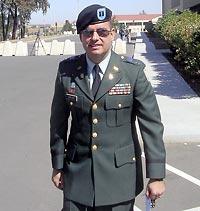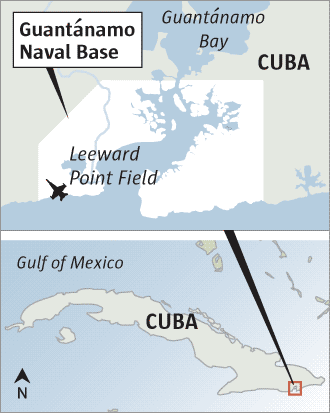— Chapter 3 —
Fear of Betrayal
Seattle Times staff reporter
A new Camp Delta security chief didn't like the "nuances" he heard in a briefing from Yee and, with others, began casting a suspicious eye on a "Muslim clique" at Guantánamo Bay Naval Base.
GUANTÁNAMO BAY, Cuba,
December 2002
Chaplain James Yee stood at the front of a room full of soldiers, dressed in his green camouflage uniform, a gold crescent moon on his black beret denoting his Islamic faith.
Large black letters flashed on the screen behind him: Who and what are the detainees?
Capt. Jason Orlich sat in the audience listening to Yee's cultural-awareness briefing, a requirement of all incoming soldiers. The briefings were intended to ease the religious conflict between guards and prisoners, and Muslim and non-Muslim soldiers.
But as the chaplain continued, Orlich, who had arrived at Guantánamo just days earlier, grew uncomfortable.
As the camp's new security chief, he was troubled by Yee's message — not in his words but in "these subtle nuances in the way he was crafting things."
"It was like he was almost trying to justify their [the extremists'] acts," he later said. "And how they think, and how they operate in the world they come from."
Something else bothered Orlich. Yee mentioned he had studied in Damascus. Orlich wondered about a man who would go to Syria — a state sponsor of terrorism — to find God.
That was the day, he said, he first became suspicious of James Yee. And he wasn't alone, he would insist.
"You could ask anyone who went through that initial briefing," he said. "Everybody who walked out after it was over sat there going, 'Is he on our side, or is he on the enemy's side?' "
If so, the complaints did not reach the chain of command. The Rev. Herbert Heavner was the head chaplain who approved the briefings. No one, he said, ever told him they were suspicious.
![]()
Several other soldiers who attended Yee's briefings about the same time also said they heard nothing wrong in them.
Before Orlich arrived at Guantánamo, his sole intelligence schooling had consisted of a monthlong course at Fort Huachuca, Ariz., and another weeklong anti-terrorism course.
 RAY RIVERA / THE SEATTLE TIMES Within days of arriving at Guantánamo, Army Reserve Capt. Jason Orlich, Camp Delta's lead security officer, became suspicious of James Yee and his Muslim colleagues. He is seen here in September 2004 at Travis Air Force Base, Calif., outside the court-martial of Ahmad Al Halabi, during which Orlich testified. |
Now at Camp Delta, he led a small team of security officers who like him had little experience, some of them right out of intelligence school.
Together, they were the eyes and ears of the prison, charged with protecting the 2,800 U.S. troops who served there from terrorist attack and making sure they followed the camp's security rules.
In the coming weeks, Orlich's suspicions deepened. Not just about Yee but about a group of his Muslim friends. They often socialized in their off hours, hosting barbecues, watching boxing matches and praying together.
"It wasn't like they could go to clubs and drink with other troops," said an officer who served with them. "So they sort of clung to each other."
Orlich, though, began to question their tight bond. To him, it didn't seem proper for officers and enlisted soldiers to spend so much time together off duty. And so much of their time seemed to revolve around religion — practicing beliefs that seemed to mirror those of the detainees. Orlich and others began referring to them as the "Muslim clique."
On his first day in camp, he discovered that a room in the building shared by his intelligence section and the camp linguists was used for daily worship by Muslim soldiers, including Yee, and civilian contract workers.
Orlich found it odd that the Muslims were breaking to pray during the workday. Worse, the building was restricted, and some of the people using it lacked proper security clearances.
And there were other problems within the camp's linguist unit. The 32-member section was run by Tariq Hashim, an Air Force captain who was part of the Muslim "clique."
GUANTÁNAMO BAY NAVAL BASE
Capt. James Yee is sent to Guantánamo in November 2002 to serve there as a Muslim chaplain.

But non-Muslim linguists serving under Hashim soon complained of unfair treatment. They claimed Hashim was giving the best jobs to Muslims on the staff, including prized missions to Afghanistan to pick up and return prisoners.
Hashim's favorites, according to the complaints, included a pair of Syrian-born translators, Samir Hejab and Ahmad Al Halabi, two others of the Muslim "clique."
The tension grew so heated the Miami-based Southern Command, which oversees Guantánamo, sent an inspector general to investigate. The complaints were deemed unfounded, two sources familiar with the investigation later said.
Frustrated, many of the non-Muslim linguists began confiding in Orlich, alerting him to things they found suspicious about the "clique."
One told him that Al Halabi, a 24-year-old Air Force supply clerk who had volunteered to serve as a linguist, had made statements sympathizing with known Middle Eastern terrorist organizations, comparing them to America's Founding Fathers.
Another said Al Halabi sometimes cried while translating detainee mail.
"Like he feels sorry for the detainees," Orlich would later say. "Or some of them would write poetry and this and that, and he's like, 'This is so beautiful.' And this is not once or twice but numerous times that people would tell me about Al Halabi."
Orlich also questioned the erratic hours the Muslim friends kept in the camp, and the time they spent in the cellblocks "shooting the crap" with prisoners.
"It was almost like reverse Stockholm syndrome, like they were advocates for the detainees," he later said. "You'd hear them say things like, 'These detainees are poor innocent dirt farmers,' and that rubbed a lot of people the wrong way."
Orlich was a devout Catholic but considered himself accepting of other religions, including Islam. Yee and his clique, however, didn't act like the moderate Muslims he knew and counted among his friends, he said.
Orlich began making mental notes, unsure if his observations were naive musings or the first signs of something sinister.
Yee was showing up at camp intelligence briefings where topics such as possible uprisings were discussed. No one seemed to question his presence, at least initially.
Army Reserve Spc. Victor Wheeler, a security manager under Orlich, believed the briefings were none of Yee's business. "For a man whose main role was supposed to be as a cultural adviser, he had a very in-depth knowledge about specific detainees, and what was going on in the camp, and what we were doing in the intelligence section."
Orlich and Wheeler also claimed Yee had sought access to an internal database used to track the prisoner cell locations, curious about why a certain detainee had been moved to isolation. An agent who later investigated the concern, however, said Yee needed such information to deliver Qurans and perform other duties.
Then there were the rules Yee helped develop that allowed only Muslim service members to handle Qurans during cell searches or when moving prisoners, except in extreme circumstances.
Orlich thought the rules illustrated how Yee was emboldening detainees and thereby hindering interrogations.
Orlich also took an interest in Yee's work in the prison library, wondering what kind of material he was handing out to detainees. And he objected to Yee's intervention in disputes between prisoners and guards: "That's not a place a chaplain belongs.
"These MPs get urine, feces, ... everything known to man, thrown at them every day, and the fact that he was siding with detainees, and I'm not talking like one MP, I'm talking like hundreds of MPs can come forward and tell you he was siding with detainees."
Once again, what Orlich saw as troubling, camp leaders saw as necessary.
"Chaplain Yee was put in an awkward position," recalled Command Sgt. Maj. John VanNatta, the prison's superintendent. "Because of his unique background, the scarcity of that religion in the chaplain's service, we relied on him to do things, and actually put him in the middle of that. And I felt he was professional in all my dealings with him."
For all their concerns, however, it was not up to Orlich and Wheeler to investigate Yee.
"Here's one thing you need to know: We were not investigating anyone," Wheeler later said. "We were all about force protection and CI [counter-intelligence] awareness. A lot of us were just out of the CI school. Our job was to write down what we saw."
Their observations went to the camp's counterintelligence office, which noted them and put them aside, never finding enough cause to investigate.
That was about to change.
Ray Rivera: 206-464-2926 or rayrivera@seattletimes.com
